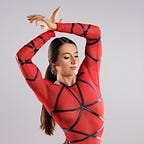Being Dolores
Imagine if Dolores was a part of your mind, something deeply and relevantly you.
How would your life look like if you could call upon that hunger for survival?
In a way, we all start as Dolores. Apparently innocent, living in a little prairie, programmed to live in a loop of safety, beauty, belonging to a specific family parcel.
Much like her, when we are faced with danger and horror, we are ill-equipped to respond. We sit in our own helplessness and we become victims.
This is the initial story of any child, since children experience as horrific even simple refusals from their mothers. The Mother turning her back to the crying child, the Mother not providing breastmilk for the hungry child, the Mother slapping her young child — these all feel horrific in that particular moment. It is then that the child plays the role of a victim.
Remaining faithful to the portrait of Dolores, the victim status outgrows and transforms only when faced with all the truth, all the facets of what makes the world function.
When we understand how the world works, who pulls the strings on our sense of motivation, on the landscape of our dreams, that is when we develop the need to survive and to oppose any motivation that doesn’t independently belong to us.
But where do we draw the line between who we are due to being made — and who we are due to being, in the present moment?
What bits of code make us behave originally and what bits are preprogrammed by our makers?
To quote the same character I’m using for this analogy:
“If you can’t tell, does it really matter?”
The answer is not that simple, because the answer is also a yes and a no.
We are here, which means a big deal of what creates our identity is pre-established by those who were here before us: parents, teachers, historic heroes and villains, political systems, cultural revolutions, censorship, technology, and chronology — they all play a part in the here and now of our existence.
But going back to Dolores, her own loop served her only up to a point. She played along until the time she didn’t.
To change is to die — and to die is not the end.
Stepping out of our loop doesn’t mean the loop is no longer there, in us, in the past. It simply means we no longer play by its scenario in the present.
When the sense of consciousness expands and we see more of the world, when we see the truth of humans, the truth of rules, the truth of the law, of history, of convention — we also see the lie. To see one is to see the other.
It is in this moment, of seeing all sides of existence, that we develop free will.
That is when we can choose to become master’s of our own destinies. We can fight our way, violently at times, scary, alone, being considered mad, malfunctioned. It’s part of the course guided by free will.
Free will requires chaos. A dismemberment of harmonious elements, a taken apart of body limbs, a reconstruction and overwriting of code. A complete re-fabrication of identity.
Much like Dolores, the innocent prairie girl will turn into an ambivalent character, relentlessly trying to survive, fighting her way from a toxically-controlled world. Sometimes, she will be liberated only to find her way into yet another apparent world.
The thing with becoming free is that you can never be truly free until there’s no more lie to see, until the world where you find yourself in is operating only on truth.
